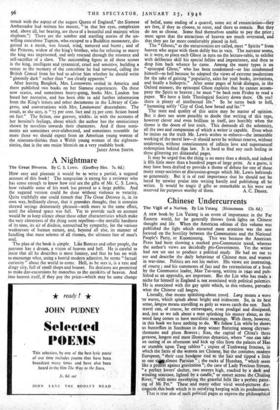A Nightmare
The Great Divorce. By C. S. Lewis. (Geoffrey Bles. 7s. 6d.)
How easy and pleasant it would be to write a partial, a sugared account of this book! The temptation is strong for a reviewer who has sense enough to know how real are the gifts of Mr. C. S. Lewis, how valuable some of his work has proved to a large public. And the sugared version could be done without violence to veracity. Quite truthfully one could remark that The Great Divorce is, in its own way, brilliantly clever, that it provokes thought, that it contains shrewd sayings dexterously phrased—with more to the same effect, until the allotted space was full. Yet to provide such an account would be to keep silence about those other characteristics which make the very cleverness of the thing seem repellent—the metallic hardness of its tone, its air of disdain, untouched by sympathy, for the various weaknesses of human nature, and, beyond all else, its manner of handling that most solemn of all themes, the ultimate fate of man's soul.
The plan of the book is simple. Like Bunyan and other people, the narrator has a dream, a vision of heaven and hell. He is careful to insist that all he describes is mere fantasy, and that he has no wish to encourage what, using a horrid modern adjective, he terms "factual curiosity" about the world to come. Hell, as he sees it, is a vast and dingy city, full of small shops and houses. Its denizens are permitted to make day-excursions by motorbus to the outskirts of heaven. And into heaven itself, if they pay the price—which may be some change
of belief, some ending of a quarrel, some act of renunciation—they are free, if they so choose' to enter, and there to remain. But they do not so choose. Some find themselves unable to pay the price ; most agree that the attractions of heaven are much overrated, and that they are far more comfortably placed in hell.
The "Ghosts," as the excursionists are called, meet " Spirits " from heaven who argue with them deftly but in vain. The narrator seems, as it were, to place each Ghost in turn on the lecture-table, to exhibit with deliberate skill his special follies and impenitence, and then to drop him back whence he came. Among the many types is an "episcopal Ghost," who has been condemned—or has condemned himself—to hell because he adopted the views of extreme modernism for the sake of gaining "popularity, sales for you'''. books invitations, and finally a bishopric." After some pages of brisk dialogue, in the Oxford manner, the episcopal Ghost explains that he cannot accom- pany the Spirit to heaven he must "be back next Friday to read a paper. We have a little Theological Society down there. Oh yes! there is plenty of intellectual life." So he turns back to hell, "humming softly 'City of God, how broad and far.'"
The taste and quality of this satire may be matter of opinion. But it does not seem possible to doubt that writing of this type, however clever and even brilliant in itself, jars horribly when the theme is the doom of lost souls. This demands all the solemnity, all the awe and compassion of which a writer is capable. Even when he insists on the truth Mr. Lewis wishes to enforce—the inexorable working of the moral law—it should never be without reserve, without tenderness, without consciousness of infinite love and supernatural redemption behind that law. It is hard to find any such feeling in these glittering yet distasteful pages.
It may be urged that the thing is no more than a sketch, and indeed it fills little more than a hundred pages of large print. At a guess, it may have been drafted to provide a theme of debate for one of those many essay-societies or discussion-groups which Mr. Lewis befriends so generously. But it is of real importance that he should not be lured by unwise praise into writing hastily and publishing all he writes. It would be tragic if gifts so remarkable as his were not
reserved for purposes worthy of them. A. C. DEANE.






























 Previous page
Previous page